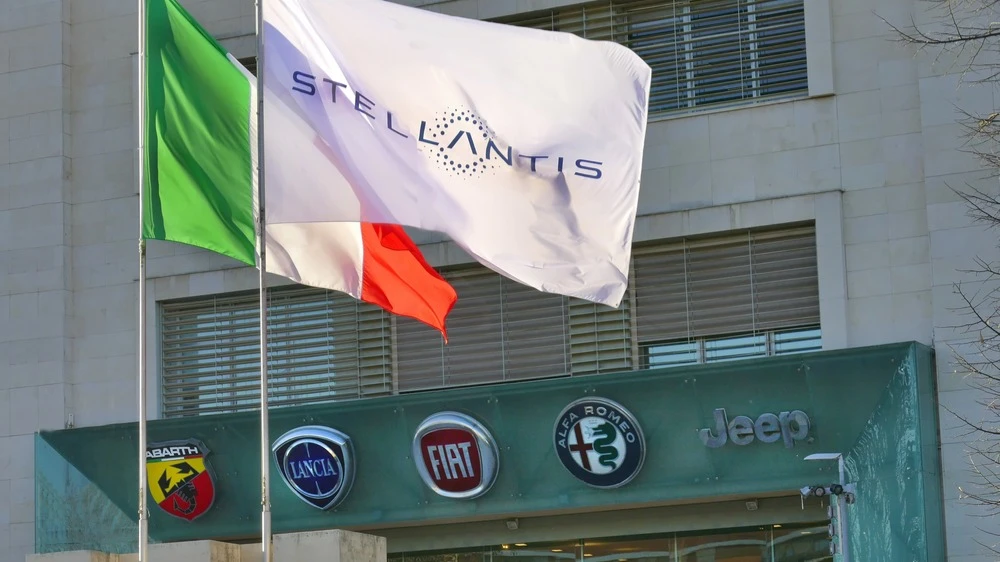Stellantis has gone into loss due to duties and other expenses. Will it be able to recover?
Amid trade turbulence, Wall Street bets on auto component makers

Stellantis, which owns brands such as Chrysler, Fiat and Peugeot, unexpectedly reported that it was unprofitable in the first half of 2025. The automaker lost €300 million due to import duties imposed and announced by US President Donald Trump. The company, which in addition to the pressure of trade restrictions has seen its position in the US market weaken, has fallen in value by almost a third this year and it is not certain it will recover, BofA warned.
Details
Stellantis posted a €2.3 billion net loss on revenue of €74.3 billion in January-June 2025 - surprising analysts - according to the company's preliminary estimates. The consensus forecast had expected the automaker to report a net profit of €1.24 billion, The Wall Street Journal reported, citing FactSet. Last year, Stellantis ended the same period with a profit of €5.62 billion on revenue of just over €85 billion.
Shares of the automaker collapsed at the auction in Milan by almost 2%. At the pre-market in New York, quotations collapsed by 2.2%, then recovered some of the losses;
The automaker said its half-year financial result included €3.3 billion of expenses - including restructuring. The company estimated the negative effect of the U.S. duties, including lost revenue as a result of suspension of production in April at plants in North America, at €300 million.
Stellantis will release its final half-year financials on July 29. The company decided to release preliminary numbers now in order to "close the gap" between analysts' expectations and reality. In late April, Stellantis annulled its 2025 financial outlook due to "uncertainty related to duties."
What the analysts are saying
The company spent €2.3 billion in cash in the six-month period, and UBS's Patrick Hummel estimates those costs are unlikely to be offset by cash flow in the second half of the year. "We believe Stellantis' dividend this year will be extremely low, perhaps even zero," the WSJ quoted quotes Hummel as saying.
The automaker has come under pressure due to competition from Chinese players and weakening demand, as well as Trump's import duties. At the same time, the loss of positions in the U.S. market was particularly heavy the company, which built its brands on the basis of American heritage, was unable to adapt the model lineup in time and was forced to increase discounts.
Jefferies in late June seen Stellantis' first signs of operational recovery after a long decline in margins and market share. The investment bank then upgraded the automaker to a "buy" rating and raised its target price from €9 to €11.5 per share.
Just two weeks later, Bank of America dropped its recommendation to buy the company's securities and sharply lowered the target from €16 to €10. Analysts at the bank, said it has a number of problems and they don't expect a recovery just yet. "Individual investors may think that stocks like Stellantis should be bought in the darkest hour before dawn, but we're not sure if that moment has arrived, or if it will arrive at all, given the ongoing technological transformation of the auto industry and the entry of new players into the market," BofA wrote.
Consensus rating of Stellantis has remained Neutral (Hold) for the past three months. FactSet's calculated average target price of $11.33 for the New York-traded stock implies a 23% upside to its July 18 closing level over a one-year horizon.
Context
General Motors, Tesla and Volkswagen will release their financial results this week, while Ford Motor, Stellantis, Mercedes-Benz and BMW will report a week later. Toyota Motor, the world's largest automaker by sales, plans to report earnings in August.
The impact of Donald Trump's duties on automakers, which have extensive global supply chains and are particularly vulnerable to such risks, is a key topic investors and analysts are now watching, writes Bloomberg. "Investors appeared unprepared for the latest round of duties announced earlier this month," the agency quoted CFRA Research analyst Garrett Nelson as saying. He gave the U.S. auto sector a neutral rating, citing, among other things, high valuations and uncertainty related to trade barriers.
According to the Bank of Japan, cited by CBT News, Japanese automakers have lowered export prices for cars to the U.S., a sign that companies are sacrificing profits to remain competitive. Industry analysts expect Toyota to fare better than other Japanese brands due to high profit margins, while Honda will be helped by its own plants in the U.S., reports Bloomberg.
In Europe, the situation is worse. VW's U.S. sales in the second quarter decreased by 16% - compared with a 4.4% increase in the first quarter, before duties. Volvo is writing off a $1.2 billion loss due to delays in launching production of new electric cars and rising tariff costs.
Betting on spare parts
Amid all the turbulence, Wall Street is betting on auto components, wrote Bloomberg. While car companies are under pressure from the authorities to keep prices down despite new duties, component suppliers are finding ways to pass the costs on to customers. In Europe, local manufacturers are winning, and especially Michelin, said Citigroup.
This article was AI-translated and verified by a human editor
